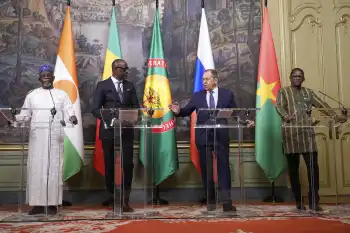In an evolving geopolitical landscape, Russia recently hosted high-level discussions with diplomats from several Sahel countries, signaling a strategic shift toward bolstering security ties in a region grappling with multifaceted challenges. As the Sahel grapples with security threats from extremist groups, rampant instability, and humanitarian crises exacerbated by climate change, the Kremlin is positioning itself as a key player in addressing these pressing concerns.
The recent talks, held in Moscow, saw foreign ministers and high-ranking officials from nations like Mali, Burkina Faso, and Niger convene for a series of strategic discussions aimed at enhancing cooperation on security and defense. This gathering underscores Russia’s commitment to increasing its footprint in a region crucial for both stability and resource access.
The Sahel region, stretching across Africa from Senegal to Sudan, has become a hotspot for jihadist violence over the past decade. Boko Haram, Al-Qaeda in the Islamic Maghreb (AQIM), and the Islamic State in the Greater Sahara (ISGS) have taken advantage of weak governance, economic challenges, and ethnoreligious tensions to destabilize the area. In recent years, thousands have died, and millions have been displaced as terrorist groups exploit the vacuum left by struggling state institutions.
In response to these challenges, the Russian government has sought to enhance security cooperation through military training, arms supplies, and intelligence-sharing agreements with Sahel nations. This outreach is particularly appealing to countries like Mali and Burkina Faso, which have turned away from traditional Western partners in favor of alternatives that promise robust support in fighting extremism without conditionality linked to human rights issues.
During the Moscow talks, Russia emphasized its willingness to provide military assistance and training to bolster the capabilities of Sahelian armed forces. Foreign ministers discussed trade and economic ties, and Moscow proposed further military engagements, including potential joint exercises aimed at enhancing regional security capabilities. Security cooperation is not limited to military aid; it also encompasses political support in international forums, where issues relevant to the Sahel can be addressed without interference from Western narratives.
This burgeoning alliance is not without criticism. Western nations, particularly France, which has been actively involved in counterterrorism efforts in the Sahel, view Russia’s engagement as an attempt to exploit the vulnerabilities of these nations for geopolitical gains. France’s military operations in the region, notably “Operation Barkhane,” aimed at fighting Islamist insurgency, faced rising resentment and calls for troop withdrawal from local populations disillusioned with perceived neocolonialism.
Russia’s emerging role in the Sahel aligns with its broader strategy to position itself as an alternative partner for nations in Africa facing challenges primarily from Western interventionism. By promoting a narrative of sovereignty and non-interference, Russia has successfully fostered trust and goodwill, translating into a more significant influence across the continent.
The Kremlin’s focus on the Sahel is part of a larger trend, as it seeks to leverage its historical ties with the continent dating back to the Soviet era. By strengthening relationships with these countries, Russia aims not only to expand its geopolitical influence but also to create new economic opportunities, particularly in resource extraction sectors such as mining, oil, and gas.
As the strategic dialogue deepens, Russia’s influence in the Sahel region will likely continue to grow, raising questions about the future balance of power and the efficacy of Western-led security initiatives. With the Sahel facing pressing security threats, partnerships based on mutual benefit can lead to potential improvements in stability, albeit with the caveat of increased Russian presence.
The Russia-Sahel partnership reaffirms the complexity of global diplomacy, where nations navigate alliances to confront common threats while adapting to an ever-changing global context. The outcomes of this engagement will be critical as the Sahel continues to struggle against the tide of violence and instability.
Email Us on editorial@nnafrica.com













